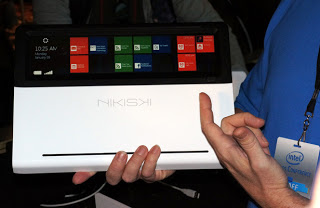Touch, voice recognition, and novel hybrid tablet-laptop designs have all been developed and will be licensed to partners such as Asus, Acer, and HP, which make ultrabooks. Eden also showed a brief demonstration of an ultrabook able to recognize hand and arm gestures made in front of its screen, using software developed by Intel. A simple game involved using a slingshot, operated by extending an arm into the space in front of the ultrabook, making a grasping motion in thin air, then pulling back and releasing to fire the catapult. “We believe that we’ll see gestures even with our ultrabook,” said Eden. He didn’t explain how the technology worked but the ultrabook appeared to have a normal camera, suggesting it was using machine vision software to process video from its webcam.
Shawn DuBravac, chief economist of the Consumer Electronics Association makes his predictions
CES this year will see regular PCs strive to become more simple themselves. Some 50 ultrabooks—very lightweight, thin laptops modeled on the MacBook Air—are expected to launch. They get their sleek looks in part thanks to designers channelling Apple, and also from throwing out USB and other ports, optical drives and large screens. Looking further ahead, PCs and tablets will also start to use voice and gesture recognition, said DuBruvac.
ee through: A prototype ultrabook called a Nikiski has a large, transparent touch pad that stretches the full width of the device.
Technology Review
If you liked this article, please give it a quick review on ycombinator or StumbleUpon. Thanks

Brian Wang is a Futurist Thought Leader and a popular Science blogger with 1 million readers per month. His blog Nextbigfuture.com is ranked #1 Science News Blog. It covers many disruptive technology and trends including Space, Robotics, Artificial Intelligence, Medicine, Anti-aging Biotechnology, and Nanotechnology.
Known for identifying cutting edge technologies, he is currently a Co-Founder of a startup and fundraiser for high potential early-stage companies. He is the Head of Research for Allocations for deep technology investments and an Angel Investor at Space Angels.
A frequent speaker at corporations, he has been a TEDx speaker, a Singularity University speaker and guest at numerous interviews for radio and podcasts. He is open to public speaking and advising engagements.


